
John Lee must act on Hong Kong’s rampant illegal development
- The explosion of outrage over the widespread practice is a reminder of the extent of disdainful disregard for the law
- Such abuse undermines respect for the rule of law, attracts corruption and calls into question government integrity
The seller told me he had, five years previously, applied to the Lands Department for a five-year short-term tenancy (STT) to tidy his legal right to “use” the garden but had so far received no reply. He suggested I reapply for one.
When I raised this with neighbours, I stirred alarm. Most said I was stupid to apply. After all, while the previous owner had lived there, no one from the government had ever challenged his right to use the garden. Why volunteer to pay what would at that time have been about HK$15,000 (US$1,900) a year?
When I decided to do the right thing, a group of village clan members stormed the Sai Kung Lands office, urging them to refuse my application. They were concerned not just that officials would want to demand STTs for their own gardens; they regarded my garden area as village land and so I was not entitled to the “exclusive” access my STT would give me.
What illegal structures were found at Hong Kong luxury estate Redhill Peninsula?
It took another three years before the Lands Department replied, ignoring the village clan protests and saying they would grant me an STT. Meanwhile, no one else in the village had applied for an STT for their own gardens and, to this day, no one from the government has come to pester them. Most neighbours still regard me as a mug for applying.
Buildings Department officials say they issued 7,225 removal orders in 2023, and prosecuted 3,310 cases. Rather than give comfort that the government is taking the issue of illegal development seriously, this seems only to illustrate the many cases that remain unnoticed or subject to removal notices that have never been followed up.
From my village vantage point, with evidence of illegal development all around, there are several easy, self-funding initiatives that could bring this routine illegality to a halt. For example, move immediately on everything that is visible and contract significant numbers of new staff to prosecute and ensure swift handling of transgressions. Higher fines would more than pay for the additional staffing cost.
Also, make clear that not just owners but architects, interior designers, contractors and even conveyancing lawyers will be prosecuted. It must be glaringly obvious to all of these professionals that work being contracted is not legal. For new homes, no occupancy permit should be issued to a buyer until a certificate of compliance with relevant building requirements is obtained.
At present, the law is a laughing stock. Such widespread and routine abuse undermines the community’s respect for the rule of law. It regards normal law-abiding people as mugs. It attracts corruption and calls into question the integrity of the entire administration. Lee’s “result-oriented” government must get serious.
David Dodwell is CEO of the trade policy and international relations consultancy Strategic Access, focused on developments and challenges facing the Asia-Pacific over the past four decades


